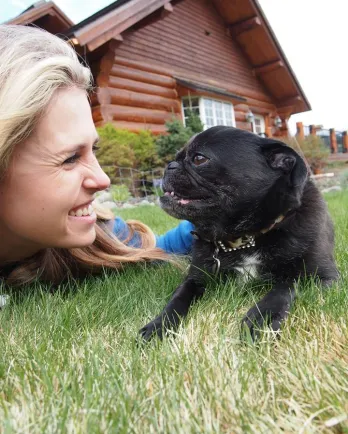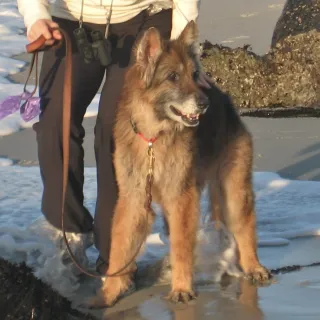Our recent post Keeping Your Senior Dog Active suggested training can improve the physical and mental health of senior dogs and help them adjust to age-related challenges. For additional information on this subject, we also recommend articles by Grey Muzzle Advisory Board Member and expert dog trainer Mikkel Becker. She discusses not only how to decide when training is helpful for senior dogs, but also reasons old dogs may acquire new bad habits and how to train dogs to compensate for loss of hearing, vision, and mobility. You can read the full articles on Vetstreet.com:
How to Help Keep Your Senior Dog's Mind and Body Healthy by Mikkel Becker
Aging can take a toll on your dog, both physically and mentally, and this can lead to a variety of behavior problems. You can help keep your senior dog healthy and happy by exercising his mind as well as his body.
Start by talking with your veterinarian about your senior dog’s health — and be sure to mention any behaviors that are concerning you. Once you’ve gotten a medical OK, there are a few simple steps you can take to help keep your older dog feeling and acting as young as possible.
Read the full article.
Joel Riner
I have a special place in my heart for elderly canines. I serve on the board of The Grey Muzzle Organization, a group devoted to assisting senior shelter dogs; as a trainer, I work with elderly dogs both in shelters and in their forever homes. As dogs age, both their mental and physical health are affected, and it is important for pet owners to know how to handle these changes.
Read the full article.
Medical issues and training issues often go hand in hand, and this is frequently true for recently developed or regressed behaviors in senior dogs. Getting your dog a medical evaluation is the first step to take. In my own experience, these behavior changes in senior pets are often closely related to medical issues. When a client brings a senior dog to me because he is soiling the house despite having been potty-trained, I ask the client to take the dog to his veterinarian for a medical workup before we begin the training. More often than not, there turns out to be a medical reason why the dog doesn't have control over his bathroom habits. I will continue with the training only after the dog's veterinarian has given me the green light.
Read the full article.
The world changes dramatically for a dog who suddenly loses one of his senses. Our family’s Golden Retriever, Shakira, recently became blind from a devastating disorder that rapidly wiped out her sight. We had mere days to teach her verbal commands to replace visual cues. Reteaching these familiar commands helped us to communicate with Shakira as her sight failed and gave her a set of safe “go-to” behaviors when she was feeling stressed or unsure in her changing world. Reinforcing basic behaviors that your dog already understands can help him adjust to a loss of hearing or vision.
Read the full article.
Teach Your Senior Dog to Use a Ramp or Stairs by Mikkel Becker
It's important to practice obedience work and tricks with senior pets, but it is also essential to train your canine to cope with the aging process. This involves both lifestyle changes and the use of portable stairs and ramps, which help geriatric pets get on and off elevated areas safely and easily. Stairs are useful when placed next to stationary resting areas, such as the bed or couch. Ramps are portable and can fold up, which makes them ideal for getting in and out of the car. Choose ramps and stairs with an anti-skid surface, which gives your dog’s paws something to grip and makes him less likely to slip or jump off the edge.
Use positive reinforcement to teach your dog to use a ramp or stairs; this will make the experience more enjoyable for your pet and will make him more likely to use these tools with confidence even when you are not around.
Read the full article.
The information presented by The Grey Muzzle Organization is for informational purposes only. Readers are urged to consult with a licensed veterinarian for issues relating to their pet's health or well-being or prior to implementing any treatment.
The Grey Muzzle Organization improves the lives of at-risk senior dogs by providing funding and resources to animal shelters, rescue organizations, sanctuaries, and other nonprofit groups nationwide.
About Mikkel Becker: Mikkel Becker offers her expertise in dog training as a member of Grey Muzzle's Advisory Board. An honors graduate of the rigorous and prestigious Academy for Dog Trainers at the San Francisco SPCA, she is the National Disaster Search Dog Foundation's canine evaluator for Washington State, a trainer for Pawsitive Works, and provides private behavior consultations and group classes for dog owners. She writes for magazines and newspapers and has co-authored the four books in the "Ultimate Pet Lover" series. Read more about Mikkel here. 


